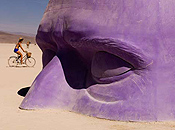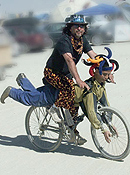Countless bikes seemed to grow fur and rove around the playa as purple dragons, zebras, and anything else the imagination could conceive in 2005. Art bikes are finally becoming the norm in Black Rock City. And no wonder, since a decorated bike is harder to misplace, easier to identify if stolen, and adds to the overall art on the playa.
Unfortunately, some bikes got lost, others were abandoned, and still others were borrowed and left somewhere else. It is impossible to tell whether a lone bike on the playa has been abandoned or intentionally left by its owner. Accordingly, no bike is considered lost until the event is officially over. Last year volunteers from the Bike Guild and DPW corralled the leftover bikes at Playa Info where participants could look for their lost bikes or leave a description so the volunteers could try to locate the bike later. The volunteers reunited about a dozen happy participants with their bikes on-playa, and eight more post-playa.
Despite our efforts to educate the community about bike theft and bike MOOP, nearly 700 unclaimed bikes remained this year at the close of the event. Two non-profits the Bike Hut in San Francisco and the Bike Club in Reno took the lion’s share. The Pyramid Lake Paiute Tribe took another forty bikes. Two other non-profits promised to send trucks to pick up some bikes; but they reneged at the last minute. After the alkali dust took its toll on the gears and moving parts, the remaining bikes went to the dump.
 Magical as it is, Black Rock City unfortunately shares some of the negative traits of other cities, including theft. Locating a stolen bicycle in Black Rock City is a rather difficult challenge, especially when the bike reported stolen turns out to have been merely borrowed by mistake or simply misplaced. To further complicate the issue, Nevada law requires that a law enforcement officer witness a bike being stolen before taking action against the thief. In 2005, however, the Black Rock Rangers successfully thwarted one would-be criminal caught in the process of stealing multiple bicycles after the event. Limitations of both law enforcement and the Black Rock Rangers leave the responsibility for preventing bike thefts with the participants of Black Rock City themselves. The easiest way to do your part is to bring and use a bike lock, which more participants are doing.
Magical as it is, Black Rock City unfortunately shares some of the negative traits of other cities, including theft. Locating a stolen bicycle in Black Rock City is a rather difficult challenge, especially when the bike reported stolen turns out to have been merely borrowed by mistake or simply misplaced. To further complicate the issue, Nevada law requires that a law enforcement officer witness a bike being stolen before taking action against the thief. In 2005, however, the Black Rock Rangers successfully thwarted one would-be criminal caught in the process of stealing multiple bicycles after the event. Limitations of both law enforcement and the Black Rock Rangers leave the responsibility for preventing bike thefts with the participants of Black Rock City themselves. The easiest way to do your part is to bring and use a bike lock, which more participants are doing.
Nothing creates radical self-reliance like a broken bike in a city without official, full-service bike repair shops. In 2005 the Bike Guild, along with other bike repair camps, offered extremely valuable support to participants in need of bike repairs. The Guild is a collective of volunteer Bike God mechanics who empower participants by teaching them how to fix their own bikes. The Guild gets most of its spare parts and inner tubes from the community itself. In 2005 the Guild threw its volunteer recruitment keg party on Wednesday instead of Monday, with the result that more volunteers signed up to work during the peak time of Thursday through Sunday.
 The organization is pleased that more bikes are being transformed into art than ever before, despite the disappointment in the number of bikes left behind after the event. Many participants have come forward with creative ideas about how to solve the problem of leftover bikes. However, the organization does not have significant resources to commit to this problem and continues to hope for a responsible non-profit that is interested in recovering them.
The organization is pleased that more bikes are being transformed into art than ever before, despite the disappointment in the number of bikes left behind after the event. Many participants have come forward with creative ideas about how to solve the problem of leftover bikes. However, the organization does not have significant resources to commit to this problem and continues to hope for a responsible non-profit that is interested in recovering them.
Submitted by,
Ray Allen

